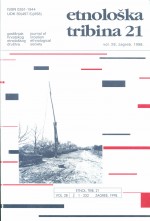Religija i etničnost kod Hrvata u Mađarskoj: socijalno- historijski pregled
Religion and Ethnicity among the Croats in Hungary: A Socio-Historical Aspect
Author(s): Josip KumpesContributor(s): Valentina Gulin Zrnić (Translator)
Subject(s): Christian Theology and Religion, Ethnohistory, Cultural Anthropology / Ethnology, Migration Studies, Ethnic Minorities Studies, Identity of Collectives
Published by: Hrvatsko etnološko društvo
Keywords: religion; ethnicity; Croats in Hungary;
Summary/Abstract: The paper raises several issues from a socio-historical aspect: do religious and cultural conditions influence the shaping of the ethnic identity of the Croats in Hungary, in which way and how much are those factors intertwined in different socio-historical circumstances and what is the impact of global social conditions on religious situation and ethnic identity. In this study of socio-historical context the results of historigraphic studies are used selectively and illustratively in order to delineate the dimensions of past social occurrences that are significant for the research of connections between religious-ecclesiastic circumstances and the ethnic identity of the Croats in Hungary: religious (confessional) relationships, ethnic relationships, religious-ecclesiastic movements together with conflicts on religious basis, migrations and some economic, political and cultural factors. The study shows that people belonging to the Croatian national minority in Hungary were mostly Catholics. Moreover, they maintained the same religious structure notwithstanding historical religious and social turbulence in the area. The author concludes that the Croatian national feeling was preserved better where some particular forms of “ethnic” religious-ecclesiastic life had been well-formed (Croatian masses, Croatian sermons, keeping and spreading of the Croatian religious customs and songs, pilgrimages etc.). The ethnic identity of the Croats in Hungary is expressed by various symbolic manifestations of culture, as well as by religion and specific religious culture and tradition. The study reveals that different courses of economic and political powers influenced the Croatian identity of the Croats in Hungary, but also that the ethnicity stands as a permanent initiator of resistance to the surrounding global power precisely because of the complex and dynamic features of the ethnicity. Finally, this study points that some correlation between religion (the Church and specific religious culture and tradition) and ethnicity may be examined on the example of Croatian national minority in Hungary, bearing in mind that religious (confessional) identity can not be equated with ethnic identity despite their mutual contacts and intertwining, and therefore, in an analysis of their connections they have to be treated separately.
Journal: Etnološka tribina : Godišnjak Hrvatskog etnološkog društva
- Issue Year: 28/1998
- Issue No: 21
- Page Range: 9-33
- Page Count: 25
- Language: Croatian

